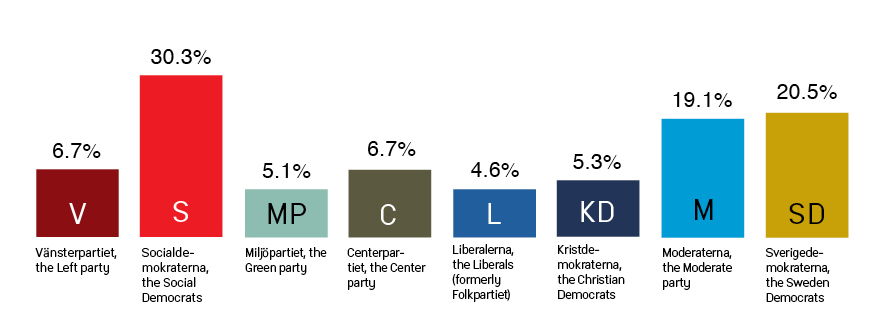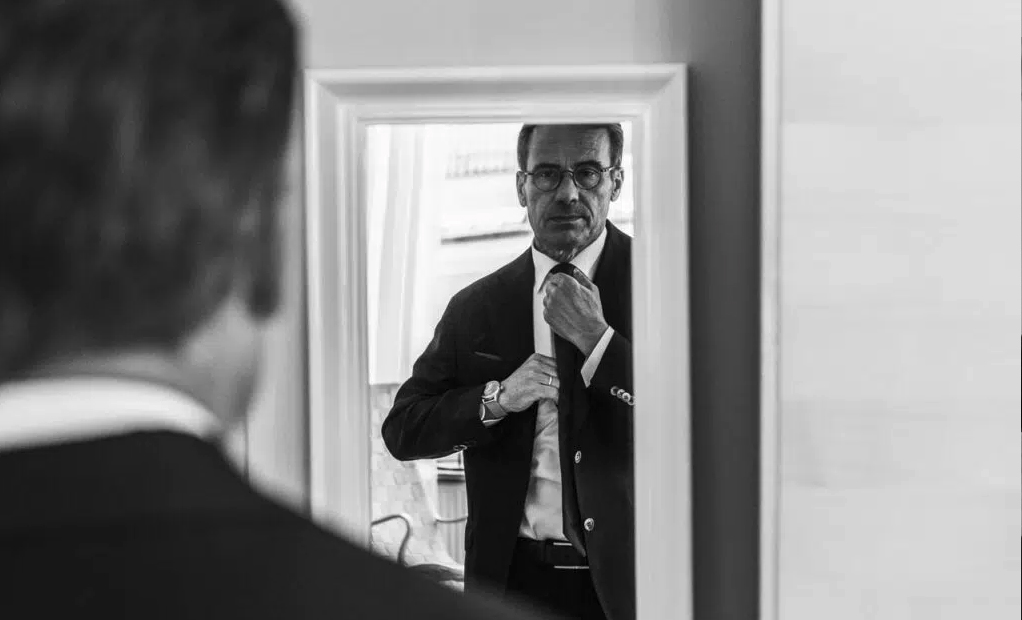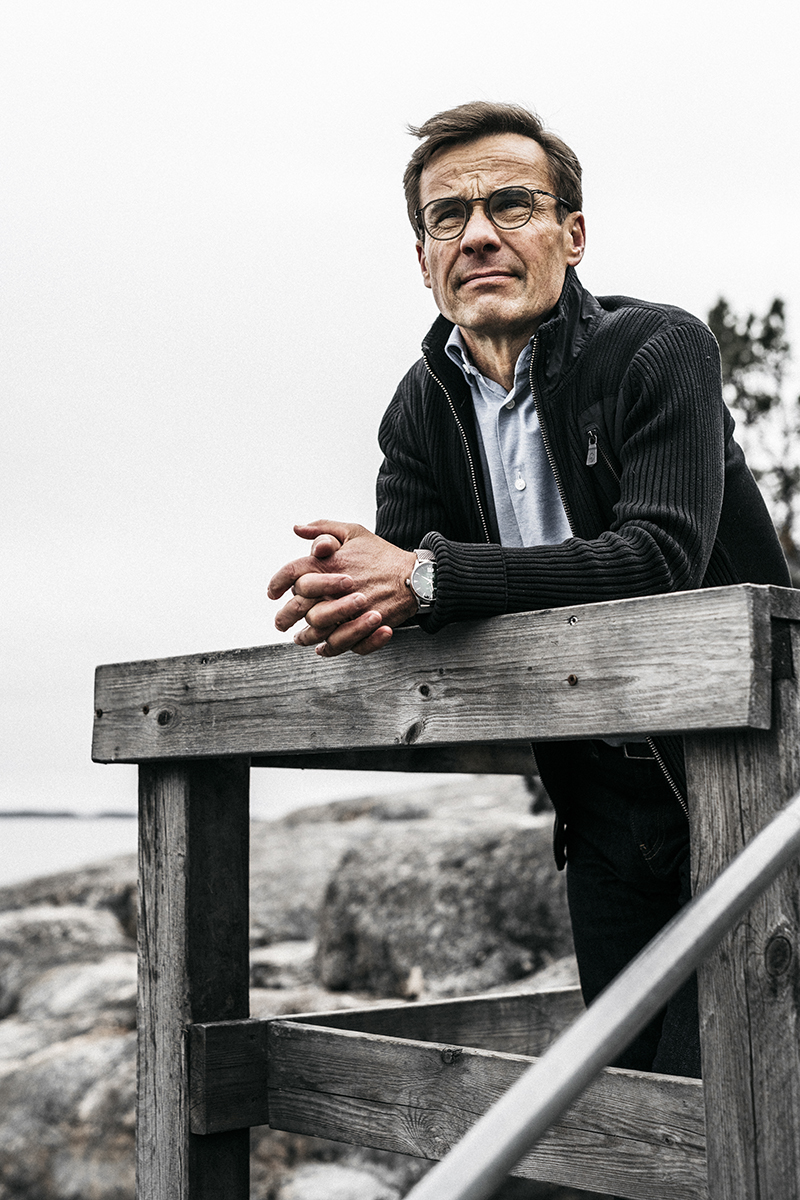Ulf Kristersson will take office as prime minister
“It feels big. I'm thankful. I am happy about the trust I have received from the Riksdag, but also noticeably humbled by the tasks that lie ahead of us," says Ullf Kristersson after the vote.
-
 Ulf Kristersson's government base with the Moderates, the Christian Democrats, the Liberals together with the Sweden Democrats won the election with 176 seats against Magdalena Andersson's government base with the Social Democrats, the Left Party, the Green Party and the Center Party which received 173 seats.
Ulf Kristersson's government base with the Moderates, the Christian Democrats, the Liberals together with the Sweden Democrats won the election with 176 seats against Magdalena Andersson's government base with the Social Democrats, the Left Party, the Green Party and the Center Party which received 173 seats. -
-
Moderate leader Ulf Kristersson will take office as prime minister. After today's vote, it was clear that 176 pushed green while 173 pushed red, which means that he will be accepted by Sweden's Riksdag. The announcement was met with a standing ovation, but also criticism from the opposition. No Member of Parliament deviated from the party line and no one pressed yellow, which means abstention. At the subsequent press conference, Ulf Kristersson was very satisfied.
-
 Moderate leader and possible new Prime Minister in Sweden Ulf Kristersson. Photo: Axel Adolfsson
Moderate leader and possible new Prime Minister in Sweden Ulf Kristersson. Photo: Axel Adolfsson -
-
October 14:
L, KD and M part of the new government - SD gains influence
The Liberals, the Christian Democrats and the Moderate parties will be part of Ulf Kristersson's new Swedish government supported in parliament by the Sweden Democrats. This was revealed at a press conference on October 14 in which the Sweden Democrats also participated. "We have come to an agreement that we feel is good for Sweden,” Ulf Kristersson said during the press meeting. -
 Moderate leader and possible new Prime Minister in Sweden Ulf Kristersson. Photo: Axel Adolfsson
Moderate leader and possible new Prime Minister in Sweden Ulf Kristersson. Photo: Axel Adolfsson -
“Sweden has serious problems. We have crime, immigration, energy policy, care queues, disorder in schools and concerns about the country's economy. All this in perhaps the most dangerous time for Sweden since World War II," Kristersson continued at today's press conference.
The government will cooperate with the Sweden Democrats, which will also have its own coordination office with political officials in the government office. And SD has passed a series of toughening measures in the area of migration, according to party leader Jimmie Åkesson, who described the upcoming migration policy as a "paradigm shift". Limited rights in the asylum process, temporary residence permits as standard and greatly tightened requirements for citizenship were some of the tightenings that were presented.
The agreement between the parties is called the Tidö Agreement, named after the castle where the negotiations were being held. It lists seven cooperation projects: Growth and household finances, crime, migration and integration, climate and energy, health and medical care, school and "other cooperation issues".
Criticism from the parties that were previously part of the government did not linger after the announcement during the press conference. The former prime minister, the Social Democrat’s party leader Magdalena Andersson welcomes Sweden getting a government in place, but worries about the country's future.
"I see great risks for our country. The right-wing parties' castle agreement will lead to increased divides and divisions. The economic policy risks making Swedes poorer by fueling inflation and raising mortgage rates while forcing cuts in healthcare, schools and care for the elderly," she said in a written comment. She believes that the agreement is to solve internal problems rather than the problems Sweden is facing. -
What happens next?
The moderate party leader Kristersson had a little more than three weeks to investigate the possibility of forming a government after he received the exploratory assignment from the Speaker of the Riksdag Andreas Norlén. Immediately after the October 14 press conference, Kristersson met with the speaker to give information about what the government will look like. "Ulf Kristersson has now reported to me that the Sweden Democrats, the Moderates, the Christian Democrats and the Liberals have reached an agreement on how Sweden should be governed in the next four years," said the speaker after the meeting. “The agreement means that these parties are ready to vote for Ulf Kristersson to be appointed as Sweden's Prime Minister ...therefore later today I will propose to the Riksdag that Ulf Kristersson be appointed as Sweden's 35th Prime Minister,” he said.
The Prime Minister's vote will take place on Monday, October 17. -
Kristersson given the task of forming government
September 14: The negotiations among the parties - the Moderates, the Christian Democrats, the Liberals and the Sweden Democrats that could become the base for Sweden's next coalition government - "are going well but may take a few weeks," was Kristersson's comment after meeting with the Speaker of the Riksdag. -
Moderate leader Ulf Kristersson has now been given the task of investigating the possibilities of forming a government according to the Speaker of the Riksdag, Andreas Norlén. During the first Speaker's discussions, Andreas Norlén spoke privately with all party leaders except Magdalena Andersson to come up with proposals for a new prime minister. "As a result of today's conversation with the party leaders, I have decided to give Ulf Kristersson the task of probing for a government that can be tolerated by the Riksdag." The government negotiations are going well but may take a few weeks, was Kristersson's comment after the meeting. By September 25 at the latest, Kristersson will hold a press conference about how the work is going. The Sweden Democrats' Jimmie Åkesson has said he wants to be part of a government. "My starting point is still that Sweden would feel good about a majority government," he said after his conversation with the speaker. The Christian Democrats' Ebba Busch commented after her conversation with the speaker that "there are good and constructive talks between the four parties." The Liberals' leader Johan Pehrson still hopes to be included in a government, while he believes that the Sweden Democrats should not be included in it. "We have been clear that we would like to find solutions, not deadlocks, but believe that SD should not be part of the government." He commented at the same time after a conversation with the speaker that the four parties have constructive talks.
-
Update from Wednesday, Sept. 14
Kristersson declares victory in the 2022 Swedish election
The Moderate (M) party leader Ulf Kristersson is likely Sweden's next prime minister and, in that case, will be the one tasked with forming a new government. On the evening of September 14, Swedish time, all the votes were finally counted and the election results were published: Ulf Kristersson's government base with the Moderates, the Christian Democrats, the Liberals together with the Sweden Democrats won the election with 176 seats against Magdalena Andersson's government base with the Social Democrats, the Left Party, the Green Party and the Center Party which received 173 seats.
The major policy areas that the new government will focus on are according to the moderates
• to bring Sweden into NATO and lead the Swedish EU presidency in 2023
• to take responsibility for the country's economy and household finances in a demanding time.
• to bring about the political reforms required to stop the shootings, end the energy crisis and break the exclusion characterized by excessive unemployment and high dependency on benefits.
The moderates went to the polls to form a right-leaning conservative government in cooperation with the Sweden Democrats, and the parties started talks immediately after election day. Exactly which parties will form part of a government is still unclear, but in several areas M, KD, SD and L have already laid the foundations for a new policy. This includes, among other things, tougher measures against criminals, stricter migration policy, the introduction of a welfare reform and switching to a more nuclear-friendly energy policy. There are some issues that could cause trouble when Kristersson is now to form a government. The Liberals with 4.6% of votes have already issued demands for cabinet posts but at the same time do not want the Sweden Democrats, who have become Sweden's second largest party, to sit in the same government. SD has dropped the demand for a Swedish exit from the EU but still advocates that the union's power over the member states be limited, while the Moderates and Liberals are pro-EU parties. The issue of Sweden's foreign aid will also be a difficult issue to resolve—M and SD want the aid to be reduced, while KD and L support the current goal that one percent of gross national income (GNI) should be set aside for aid. It is also likely that even if the parties have agreed on guidelines and certain proposals with regard to migration, SD probably wants to go much further and advocates e.g. that Sweden's right to asylum is lowered to the EU's minimum level. -
-
